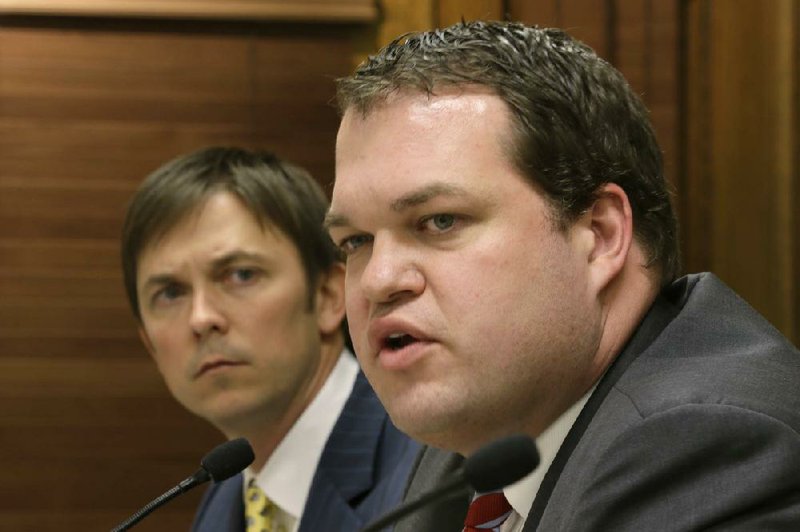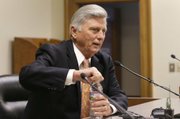LITTLE ROCK — House Speaker-designee Davy Carter and incoming Senate President Michael Lamoureux said Monday that they don’t expect the new Republican-controlled Legislature to make any cuts to Medicaid programs in 2013.
The Republican leaders suggested the state use increased state tax revenue and additional surplus funds to forestall $138 million in Medicaid cuts proposed by Gov. Mike Beebe’s administration in fiscal 2014.
Lamoureux of Russellville said, “I don’t think there will be any cuts to Medicaid.”
Carter of Cabot added, “I don’t either.”
Beebe said he’s willing to listen to the Republican legislators’ ideas, but pointed out that his budget already shifts $90 million in general revenue and $70 million in surplus funds to the program in fiscal 2014. He said there are other needs for the surplus such as business incentives and building repairs.
“I understand that we’re all focusing right now on Medicaid and we should be because that’s the top priority issue and it’s real human beings with real lives that are affected. But we don’t look at all this stuff in a total vacuum,” Beebe said. “I have an obligation for everything in the budget.”
The governor and the legislative leaders spoke to reporters and editors at the Capitol Monday at a meeting sponsored by the Arkansas Associated Press Managing Editors.
Medicaid’s shortfall is projected to be $298 million in fiscal 2014. Medicaid is a $5 billion state and federally funded program serving about 780,000 Arkansans.
Even if the Legislature follows the governor’s existing recommendation, $139 million would still have to be cut from the state Department of Human Services’ budget, according to department officials.
State revenue officials project a surplus of about $300 million, with $99.5 million of new surplus funds expected as a result of a Nov. 15 increase in the state general-revenue forecast for fiscal 2013. Beebe said he’s also proposing using $70 million of the surplus for the Medicaid program in fiscal 2015.
The governor has proposed using $143.7 million from the state’s surplus for state operating budgets in fiscal year 2014 and 2015, state Budget Director Brandon Sharp said. The governor will release his full list of recommendations for General Improvement Fund projects after the start of the session on Monday, he said.
The state’s general revenue budget is $4.727 billion in fiscal 2013 and Beebe has proposed a budget of $4.947 billion in fiscal 2014, including $10 million in rainy day funds, and $5.13 billion in fiscal 2015, including $10 million in rainy day funds, according to Sharp.
The 2013 General Assembly will set the budget for fiscal year 2014.
Carter and Lamoureux told reporters they believe the proposed Medicaid cuts in fiscal 2014 could be avoided through the use of increased tax revenue and more surplus funds than Beebe has proposed using.
Lamoureux said reductions elsewhere in Beebe’s proposed budget for fiscal 2014 could be used to avoid Medicaid cuts.
The state Department of Human Services has proposed several cuts, including eliminating adult dental care and a health insurance program for the working poor.
Legislators have objected to eliminating level 3 nursing care, which is care for people who are totally dependent on another person for mobility, feeding or using the toilet, or people who need limited assistance in two of the categories. State Medicaid Director Andy Allison has said the cut would mean 10,000 to 15,000 senior citizens and disabled people would no longer have nursing care.
Carter said, “That’s a no brainer to me. We are not going to do that. We are going to fund those needs and that is a category of Arkansans who are in the most need. ... I haven’t heard one member say they want to do that. That is just not going to happen.”
Lamoureux said he’s not heard any legislator suggest such a cut is going to happen either.
He said using one-time surplus funds to fund ongoing state needs such as the Medicaid program is “not a perfect idea.”
But Lamoureux said, “It is definitely a better idea than doing nothing. Making things work for one or two years is better than letting them fall apart with hundreds of millions dollars available to prevent that harm.”
Carter said he generally agreed with Lamoureux.
“Sometimes you can do all you can and I think this is one of those occasions where we got to make that happen,” he said.
Beebe said he can’t stomach that nursing-care cut either.
“We’re not going to let that happen,” Beebe said. “I don’t know how we’re going to fix it yet, but there are some parts of this we can’t do. How in the heck do you throw those level three nursing homes folks out of nursing homes?”
Beebe has said that expanding the state Medicaid program as allowed under the federal Patient Protection and Affordable Care Act would be the best way to avoid cuts to nursing care.
The expansion would allow an estimated 250,000 working poor access to Medicaid services. The federal government would cover 100 percent of the cost for the first few years, with the state share gradually increasing to 10 percent of the cost by 2020.
Expanding the Medicaid program would require a three fourths vote in the House and Senate. A three-fourths vote would require 75 votes in the 100-member House and 27 votes in the 35-member Senate.
Carter and Lamoureux said the federal government’s directive that states either have to completely implement an expansion of their Medicaid programs or don’t do it at all will make it more difficult to win legislative approval for the proposed expansion.
“Ideally, us sitting here and a lot of the membership wishes that weren’t the case. Maybe there is still some hope out there that we have some flexibility to tailor a program that is good for Arkansas,” Carter said.
“We can take a deep breath. We don’t have to do this tomorrow or next week,” Carter said.
Lamoureux said he hopes to get more clarity from the federal government regarding the state’s options for expanding the Medicaid program.
“With the all or nothing approach the federal government is trying to enforce on us, I think it makes the task more difficult,” he said. “I don’t feel any rush either. We need to take our time and do this right.”
Beebe said the federal government has been firm that there is no wiggle room on expansion, but if lawmakers want him to ask for an exception he’ll try.
“Let’s be realistic; I don’t have any magic wand,” Beebe said.
Asked how he would sell expanding the Medicaid program to Republican lawmakers who campaigned against it, Carter said he isn’t yet sold on expanding Medicaid.
“I’ve never said this was going to be some cakewalk either way,” he said. “There are a lot of strong opinions on the issue and we are going to have to analyze it and make recommendations and see what we think is best for the state.”
“I am pretty sure the federal government can’t afford to do this, but we are state legislators,” Carter said later. “What’s best for the state? Let’s just look at the math. There are conflicting opinions about that as well.”
Lamoureux said, “Hopefully we can meet in the middle where there is some degree of expansion that covered the people that maybe the Democratic members want to see covered, maybe the bottom half of the total eligible pool, and couple that with conservative reforms that others want.”
These conservative changes could include scaling back on some services, possible drug testing to refer people to treatment and possible co-payments to direct care more efficiently, he said.
Front Section, Pages 1 on 01/08/2013


